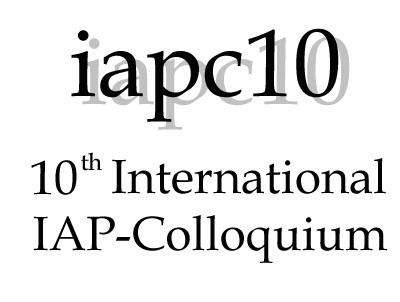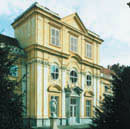INTEGRATIVE
PHYSIOLOGY AND
INTERDISCIPLINARITY
June 2nd, 2006
Meerscheinschlössl, Mozartgasse 3, Graz, Austria
Supported by
The Karl-Franzens-University
of Graz, and the Medical University
of Graz
Program
9.00 Welcome
Friedrich
Zimmermann (Karl Franzens University)
Gerhard Franz
Walter (Medical University)
Wolfgang
von der Linden (Technical University)
9.05 Helmut
Hinghofer-Szalkay: Opening remarks
9.10 Christoph Kratky:
The Austrian Science Fund FWF: Current state and future perspectives
9.30 Allen W. Cowley, Jr.:
The new challenges of post-genomic physiology
Coffee Break
10.30 Peter J. Hunter: Computational physiology
and the IUPS Physiome Project
11.00 Gernot Plank:
Computational Biology - Development and Electrophysiological Applications
of a 'Virtual Heart'
11.30 Ronald J. White: Understanding
human physiology in space
Allen W. Cowley, Jr.
Professor
and Chairman, Medical College of Wisconsin, Milwaukee, Wisconsin, USA
Allen Cowley’s research has focused on the study of high blood pressure
to create ways to bring about a meaningful convergence of the genetic and
physiological responses to environmental perturbations. Over the past decade
this research has been directed toward elucidating genetic and physiological
pathways that determine the function of the kidney, blood vessels and endocrine
systems that influence blood pressure. This work with his colleagues culminated
in the first comprehensive systems biology map of cardiovascular function
published in Science in 2001. Dr. Cowley has served as the chairman of the
Council for High Blood Pressure Research of the AHA, as the president of
American Physiological Society, and as the president of the International
Union of Physiological Sciences. He is the chairman of the Department of Physiology at the Medical
College of Wisconsin.
Peter J. Hunter
Director,
Bioengineering Institute, Auckland University, New Zealand
Peter Hunter is the Director of the Bioengineering Research Institute
(BRI) of the University of Auckland,
director of Computational Physiology at Oxford University and holds honary
or visiting Professorships at Oxford University, Osaka University and the
University of Queensland. He is on the scientific advisory boards of a number
of Research Institutes in Europe, the US and the Asia-Pacific region. He
is an elected Fellow of the Royal Society (NZ), the World Council for Biomechanics,
the American Institute for Medical and Biological Engineering, and the International
Academy of Medical & Biological Engineering. His major research interests
are modelling many aspects of the human body and an anatomically and biophysically
based approach which incorporates detailed anatomical and microstructural
measurements and material properties into the continuum models. The interrelated
electrical, mechanical and biochemical functions of the heart, for example,
have been modelled in the first ‘physiome’ model of an organ. As the current
co-Chair of the Physiome
Committee of the International Union of Physiological Sciences he is
helping to lead the international Physiome Project which aims to use computational
methods for understanding the integrated physiological function of the body
in terms of the structure and function of tissues, cells and proteins.
Christoph Kratky
President, Austrian Research
Fund
Christoph Kratky is Austrian representative in numerous international
institutions. He established a Structural Boiology task group of about 15
coworkers at the Karl-Franzens University Graz. His scientific work includes
3D-determination of biomolecules and the development of novel protein-crystallography
techniques. He authored about 200 scientific papers and gives invited lectures
worldwide.
Gernot Plank
Assistant Professor, Institute
of Medical Physics, Medical University Graz, Austria
Gernot Plank is Assistant Professor at the Medical University Graz, Department of Biophysics.
Most of his research activities have been carried out in Valencia, Spain
and Calgary, Canada (2000-03). Since 2004, Dr. Plank is project partner of
the Intergrative Biology Project (http://www.integrativebiology.ac. uk),
and as such he has access to some of the most powerful supercomputers available
today allowing to actually make such simulations work.
Ronald J. White
Senior Fellow, Universities
Space Research Association, Houston, Texas
Ronald White has been a Senior Fellow at the Universities Space Research Association
in Houston since 2003. Prior to that, from 1996 to 2003, he was a Professor
at Baylor College of Medicine and was Associate Director of the National
Space Biomedical Research Institute from 1997 to 2003. From 1985 to 1996,
he served as the Chief Scientist of the Life Sciences Division at NASA Headquarters
in Washington, DC and, at the same time, was Research Professor of Physiology
at the Uniformed Services University of the Health Sciences in Bethesda,
MD. He held positions as Senior Scientist and Manager of Biomedical Research,
Analysis, and Planning at General Electric Company from 1980 to 1985. Dr.
White was Professor of Mathematics and Director of Honors at the University
of Southwestern Louisiana (now the University of Louisiana at Lafayette)
from 1975 to 1980 and held various other teaching positions at this university
from 1970 to 1975. His training in physiology was obtained at the University
of Mississippi Medical School under Professor Arthur Guyton.


